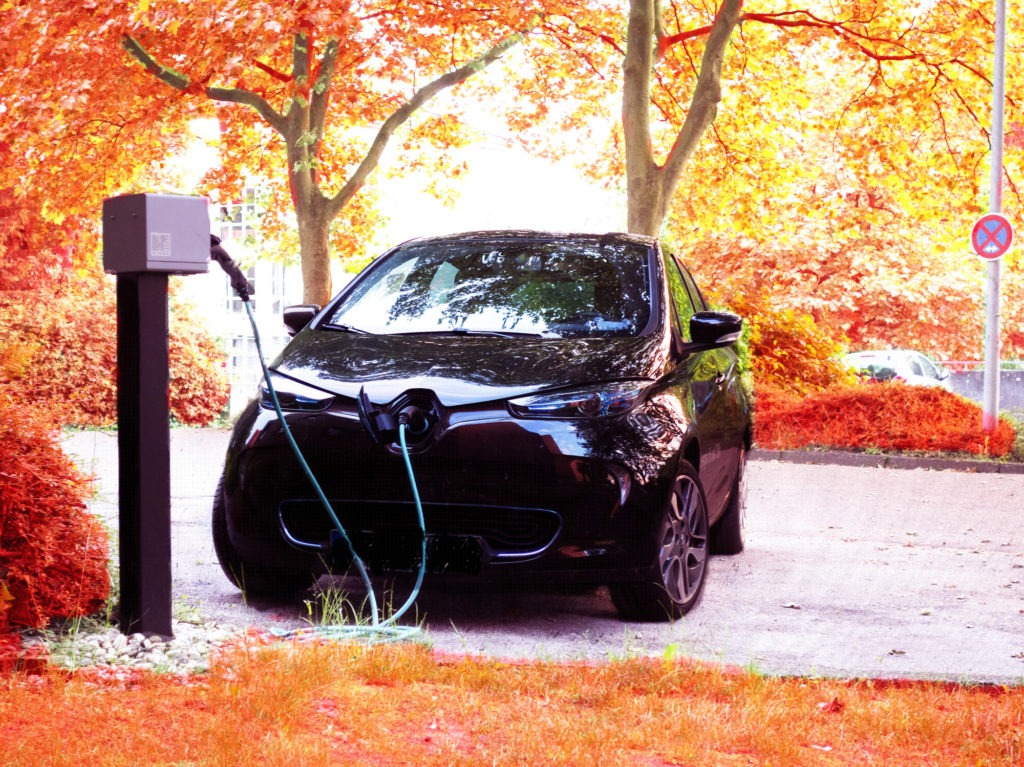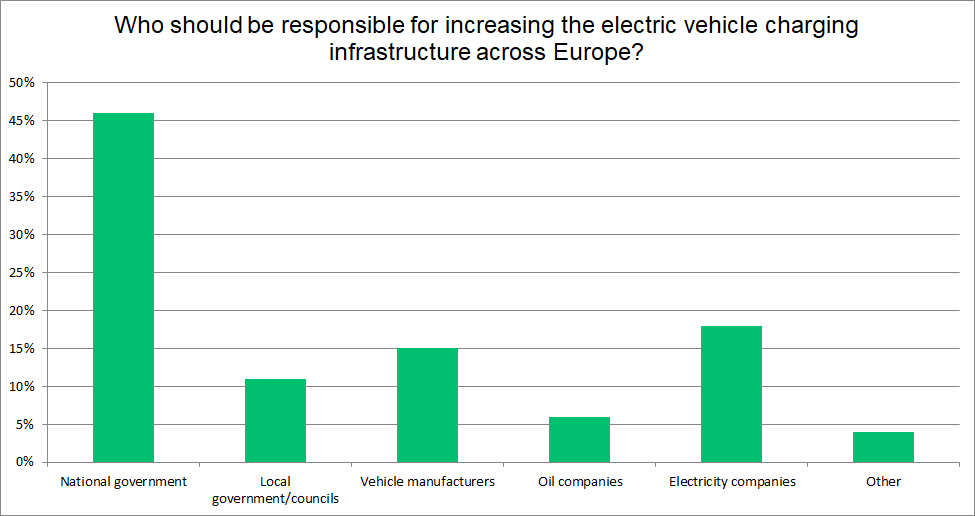Governments should be responsible for EV infrastructure
26 April 2019

26 April 2019
Almost half of those involved in the automotive industry feel that national governments should be taking the lead when it comes to increasing EV infrastructure.
In Autovista Group’s latest survey, 46% felt that it was the responsibility of a country’s authorities to ensure there are enough charging points for plug-in electrified vehicles. Many feel that although these authorities are pushing for drivers to take up electric vehicles, they are not doing enough to support them afterwards.
 Future bans
For example, the UK and France are planning to ban the sale of petrol and diesel vehicles by 2040, yet there is still only talk about upgrading the charging infrastructures. While sales of EVs increase, little is being done to prepare for a massive potential uptake in just twenty years’ time. Alongside charging points, there will also need to be provision made to improve power supply ahead of a surge in demand.
It is this measure that likely matters to the 18% of voters who selected electricity companies as being responsible for improving the charging infrastructure across Europe. Energy providers will soon find demands on their services stretched and need to ensure they are ready. The UK’s National Grid has warned in the past of the work required to ensure networks can cope. With the building of new houses soon to require charging point installation, the infrastructure could be seen as the responsibility of the electric companies across the continent.
Joint ventures
With 15% of the votes, the option of manufacturers was the next most popular. While only coming third, carmakers seem to be the most active in ensuring their future vehicles have a point to plug in to. Volkswagen launched its mobile charging service at the start of the year while several carmakers, together with energy providers and oil companies, have formed a group targeting the roll out of fast-charging units across Europe.
Some manufacturers also have an obligation to ensure that when an EV is bought, a charging point is installed at the customer’s home. If such measures continue, this should ensure drivers have a full top-up of electricity when they need to use their vehicle, provided they start their journey from their residence.
Planning issues
Just over a tenth (11%) of respondents felt that the responsibility lay with local government and councils. As they are responsible for town planning, including new car parks and buildings, they should also control the installation of charging points.
Just 6% felt that oil companies should increase charging infrastructure. However, the industry is another vocal component of being ready for the influx of new technologies. Both Shell and BP have invested in charging technology in recent years, perhaps due to the threat that electrification poses to their main profit generator – fuel. Such threats can drive change forward so while only 6% believe it, oil companies do have a significant part to play.
Finally, 4% chose the option of ′other’ with all comments suggesting that private companies, such as those who own shopping and leisure complexes, should be building charging points into their plans. Others felt that more should be done to encourage cleaner internal combustion engines, meaning that no one would be responsible for increasing the EV infrastructure.
Future bans
For example, the UK and France are planning to ban the sale of petrol and diesel vehicles by 2040, yet there is still only talk about upgrading the charging infrastructures. While sales of EVs increase, little is being done to prepare for a massive potential uptake in just twenty years’ time. Alongside charging points, there will also need to be provision made to improve power supply ahead of a surge in demand.
It is this measure that likely matters to the 18% of voters who selected electricity companies as being responsible for improving the charging infrastructure across Europe. Energy providers will soon find demands on their services stretched and need to ensure they are ready. The UK’s National Grid has warned in the past of the work required to ensure networks can cope. With the building of new houses soon to require charging point installation, the infrastructure could be seen as the responsibility of the electric companies across the continent.
Joint ventures
With 15% of the votes, the option of manufacturers was the next most popular. While only coming third, carmakers seem to be the most active in ensuring their future vehicles have a point to plug in to. Volkswagen launched its mobile charging service at the start of the year while several carmakers, together with energy providers and oil companies, have formed a group targeting the roll out of fast-charging units across Europe.
Some manufacturers also have an obligation to ensure that when an EV is bought, a charging point is installed at the customer’s home. If such measures continue, this should ensure drivers have a full top-up of electricity when they need to use their vehicle, provided they start their journey from their residence.
Planning issues
Just over a tenth (11%) of respondents felt that the responsibility lay with local government and councils. As they are responsible for town planning, including new car parks and buildings, they should also control the installation of charging points.
Just 6% felt that oil companies should increase charging infrastructure. However, the industry is another vocal component of being ready for the influx of new technologies. Both Shell and BP have invested in charging technology in recent years, perhaps due to the threat that electrification poses to their main profit generator – fuel. Such threats can drive change forward so while only 6% believe it, oil companies do have a significant part to play.
Finally, 4% chose the option of ′other’ with all comments suggesting that private companies, such as those who own shopping and leisure complexes, should be building charging points into their plans. Others felt that more should be done to encourage cleaner internal combustion engines, meaning that no one would be responsible for increasing the EV infrastructure.
 Future bans
For example, the UK and France are planning to ban the sale of petrol and diesel vehicles by 2040, yet there is still only talk about upgrading the charging infrastructures. While sales of EVs increase, little is being done to prepare for a massive potential uptake in just twenty years’ time. Alongside charging points, there will also need to be provision made to improve power supply ahead of a surge in demand.
It is this measure that likely matters to the 18% of voters who selected electricity companies as being responsible for improving the charging infrastructure across Europe. Energy providers will soon find demands on their services stretched and need to ensure they are ready. The UK’s National Grid has warned in the past of the work required to ensure networks can cope. With the building of new houses soon to require charging point installation, the infrastructure could be seen as the responsibility of the electric companies across the continent.
Joint ventures
With 15% of the votes, the option of manufacturers was the next most popular. While only coming third, carmakers seem to be the most active in ensuring their future vehicles have a point to plug in to. Volkswagen launched its mobile charging service at the start of the year while several carmakers, together with energy providers and oil companies, have formed a group targeting the roll out of fast-charging units across Europe.
Some manufacturers also have an obligation to ensure that when an EV is bought, a charging point is installed at the customer’s home. If such measures continue, this should ensure drivers have a full top-up of electricity when they need to use their vehicle, provided they start their journey from their residence.
Planning issues
Just over a tenth (11%) of respondents felt that the responsibility lay with local government and councils. As they are responsible for town planning, including new car parks and buildings, they should also control the installation of charging points.
Just 6% felt that oil companies should increase charging infrastructure. However, the industry is another vocal component of being ready for the influx of new technologies. Both Shell and BP have invested in charging technology in recent years, perhaps due to the threat that electrification poses to their main profit generator – fuel. Such threats can drive change forward so while only 6% believe it, oil companies do have a significant part to play.
Finally, 4% chose the option of ′other’ with all comments suggesting that private companies, such as those who own shopping and leisure complexes, should be building charging points into their plans. Others felt that more should be done to encourage cleaner internal combustion engines, meaning that no one would be responsible for increasing the EV infrastructure.
Future bans
For example, the UK and France are planning to ban the sale of petrol and diesel vehicles by 2040, yet there is still only talk about upgrading the charging infrastructures. While sales of EVs increase, little is being done to prepare for a massive potential uptake in just twenty years’ time. Alongside charging points, there will also need to be provision made to improve power supply ahead of a surge in demand.
It is this measure that likely matters to the 18% of voters who selected electricity companies as being responsible for improving the charging infrastructure across Europe. Energy providers will soon find demands on their services stretched and need to ensure they are ready. The UK’s National Grid has warned in the past of the work required to ensure networks can cope. With the building of new houses soon to require charging point installation, the infrastructure could be seen as the responsibility of the electric companies across the continent.
Joint ventures
With 15% of the votes, the option of manufacturers was the next most popular. While only coming third, carmakers seem to be the most active in ensuring their future vehicles have a point to plug in to. Volkswagen launched its mobile charging service at the start of the year while several carmakers, together with energy providers and oil companies, have formed a group targeting the roll out of fast-charging units across Europe.
Some manufacturers also have an obligation to ensure that when an EV is bought, a charging point is installed at the customer’s home. If such measures continue, this should ensure drivers have a full top-up of electricity when they need to use their vehicle, provided they start their journey from their residence.
Planning issues
Just over a tenth (11%) of respondents felt that the responsibility lay with local government and councils. As they are responsible for town planning, including new car parks and buildings, they should also control the installation of charging points.
Just 6% felt that oil companies should increase charging infrastructure. However, the industry is another vocal component of being ready for the influx of new technologies. Both Shell and BP have invested in charging technology in recent years, perhaps due to the threat that electrification poses to their main profit generator – fuel. Such threats can drive change forward so while only 6% believe it, oil companies do have a significant part to play.
Finally, 4% chose the option of ′other’ with all comments suggesting that private companies, such as those who own shopping and leisure complexes, should be building charging points into their plans. Others felt that more should be done to encourage cleaner internal combustion engines, meaning that no one would be responsible for increasing the EV infrastructure.